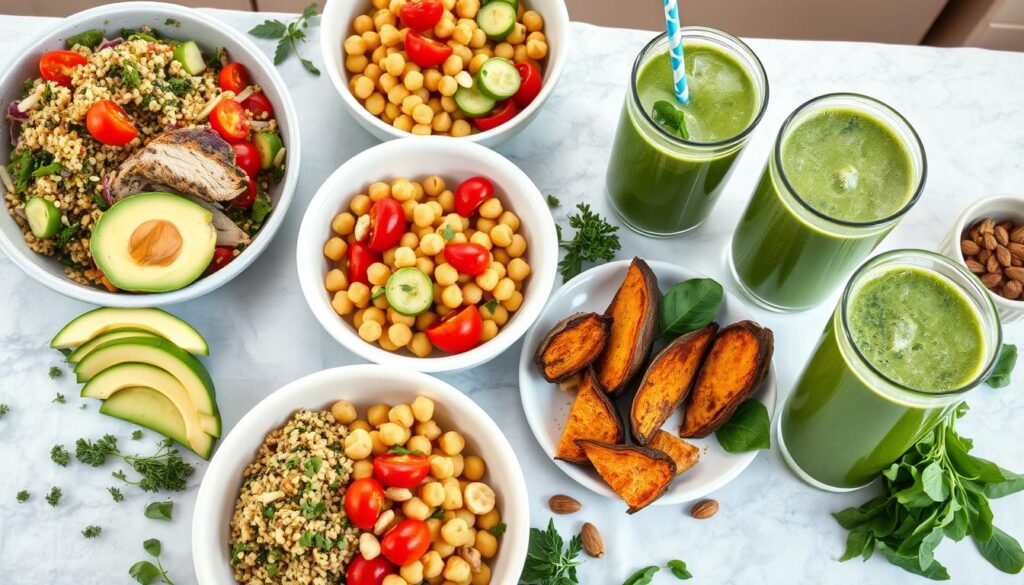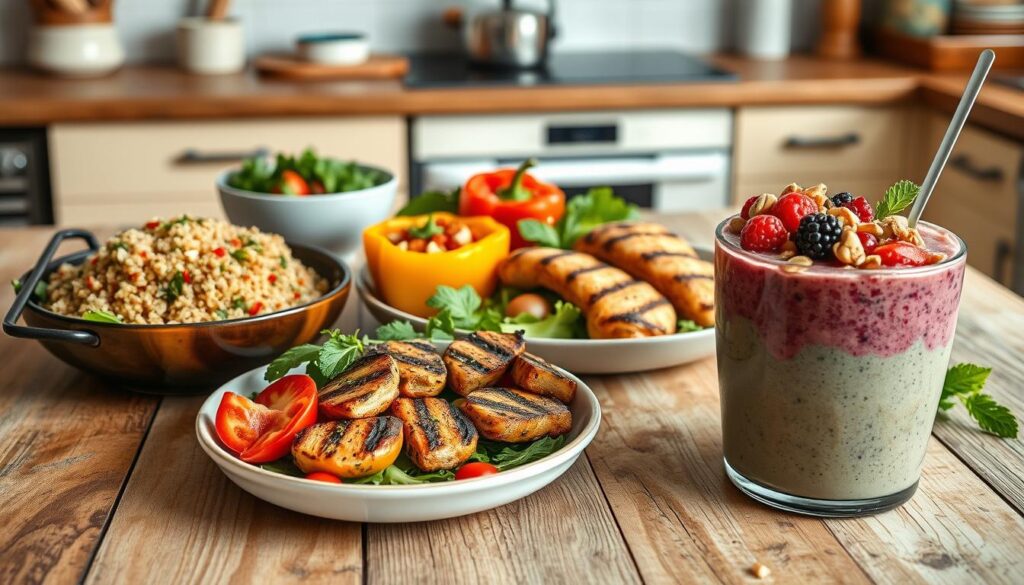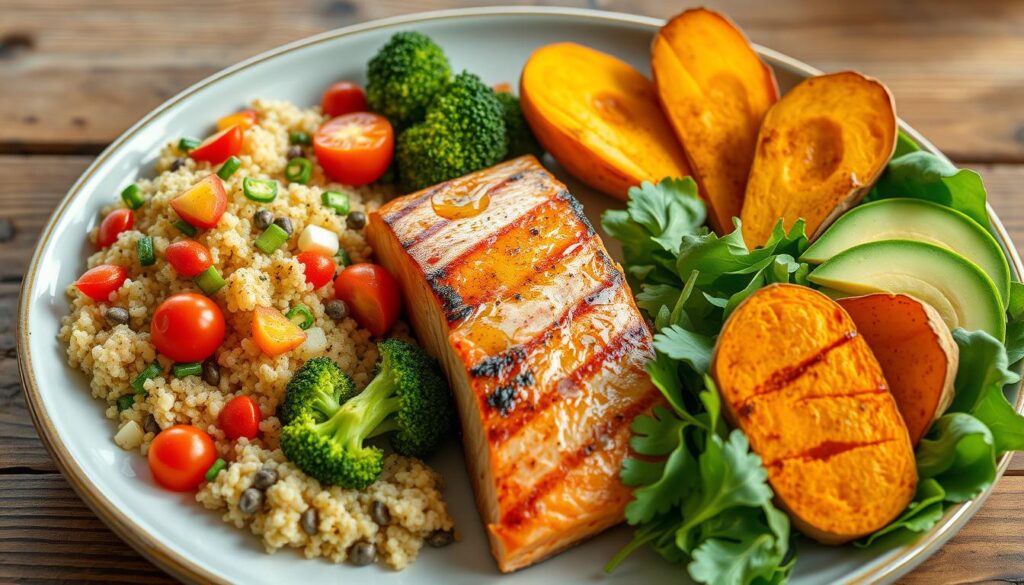Table of Contents
Living with polycystic ovarian syndrome (PCOS) can be tough. Finding meals that are good for you and don’t make symptoms worse is hard. But, there’s a way to take charge of your health with the right lunch recipes.
PCOS is a hormonal disorder that affects women of childbearing age. It can cause insulin resistance, leading to weight gain, cravings, and tiredness. It also causes chronic inflammation, increasing the risk of diabetes and heart disease. But, changing your diet can help manage these issues.
This guide offers a variety of tasty and healthy PCOS lunch recipes. These meals help control blood sugar and reduce inflammation. By choosing the right foods at lunch, you can manage your symptoms better and improve your health in the long run.
Key Takeaways
- PCOS is characterized by insulin resistance and chronic inflammation, which can lead to a range of symptoms and health concerns.
- Eating a balanced, PCOS-friendly lunch can help stabilize blood sugar levels and reduce inflammation.
- Incorporating complex carbohydrates, lean protein, healthy fats, and fiber-rich foods into your lunch is crucial for PCOS management.
- Meal planning and preparation are key to ensuring you have nourishing, PCOS-friendly options available throughout the week.
- Focusing on anti-inflammatory, low-glycemic ingredients can help improve overall PCOS symptoms and reduce disease risk.
Understanding PCOS and Nutrition Basics
Polycystic Ovary Syndrome (PCOS) is a common hormonal disorder in the U.S. It affects 6% to 12% of women of childbearing age. Symptoms include irregular periods, infertility, and weight gain.
The Role of Insulin Resistance in PCOS
Insulin resistance is a big problem in PCOS, affecting 35% to 80% of those with it. It causes high insulin levels, leading to weight gain and fatigue. Eating right and staying active can help manage PCOS symptoms and prevent other diseases.
Impact of Inflammation on PCOS Symptoms
Women with PCOS often have low-grade inflammation. This can make symptoms like irregular periods and acne worse. Eating foods that fight inflammation, like fatty fish and fruits, can help.
Key Nutrients for PCOS Management
- Complex carbohydrates and fiber-rich foods: Help balance blood sugar levels and support insulin sensitivity.
- Lean protein sources: Provide essential amino acids and can help manage hunger and cravings.
- Healthy fats: Promote hormone balance and reduce inflammation.
Eating a balanced diet rich in these nutrients can help manage PCOS symptoms. It also lowers the risk of other health problems.
“A healthy diet can significantly improve insulin resistance and inflammation in PCOS, leading to better management of symptoms and reduced risk of chronic diseases.”
Building Blocks of a PCOS-Friendly Lunch
Managing polycystic ovary syndrome (PCOS) can be easier with a balanced lunch. Focus on complex carbs, lean proteins, and healthy fats. These are the key to a PCOS-friendly meal.
Start with complex carbs like whole grains, fruits, and veggies. They help keep blood sugar stable and provide fiber. Try to fill half your plate with non-starchy veggies like leafy greens and bell peppers.
Then, add a lean protein source. Grilled chicken, baked tofu, or Greek yogurt are great choices. They help manage insulin and PCOS symptoms. Aim for 3-4 ounces of protein per meal.
Finally, add healthy fats like avocado, olive oil, nuts, or seeds. They reduce inflammation and provide important vitamins and minerals. But remember, healthy fats are high in calories, so watch your portion sizes.
By balancing these nutrients, you’ll make a pcos diet recipes that’s tasty and healthy. Remember, portion control is key. Listen to your body’s hunger and fullness cues.

With a bit of planning, you can make a low glycemic lunch ideas that’s both delicious and nourishing. The options are endless for a PCOS-friendly lunch that meets your needs and tastes.
Essential Ingredients for Hormone-Balancing Meals
Managing PCOS (Polycystic Ovary Syndrome) is a big job, and diet is key. Adding certain ingredients to your meals can help balance hormones and ease symptoms. Let’s look at the must-haves for hormone-balancing recipes and snacks friendly to PCOS.
Complex Carbohydrates and Fiber Sources
Complex carbs like fruits, veggies, and whole grains are vital. They help keep blood sugar steady and give you energy that lasts. They’re also full of fiber, which is good for insulin and digestion. Here are some great complex carbs:
- Whole grains (quinoa, brown rice, oats)
- Legumes (chickpeas, lentils, black beans)
- Leafy greens (spinach, kale, arugula)
- Colorful fruits and vegetables (berries, sweet potatoes, bell peppers)
Lean Protein Options
Adding lean proteins to your meals is important. They help keep muscles strong, make you feel full, and support hormone balance. Here are some top picks:
- Chicken or turkey breast
- Tofu and tempeh (fermented soy products)
- Greek yogurt
- Salmon and other fatty fish
Healthy Fats Selection
Healthy fats like avocado, olive oil, and nuts are great. They reduce inflammation and improve heart health, both key for PCOS. They also help with hormone production and regulation. Add these healthy fats to your meals:
- Avocado
- Nuts and seeds (almonds, walnuts, chia, flax)
- Olive oil
- Fatty fish (salmon, mackerel, sardines)
By mixing complex carbs, lean proteins, and healthy fats in your meals, you can make recipes and snacks that help your health and balance hormones.

Quick and Easy PCOS Lunch Recipes
For those with polycystic ovary syndrome (PCOS), eating well is key. Luckily, there are many quick and tasty PCOS-friendly lunch recipes. These meals mix complex carbs, lean proteins, and healthy fats for a balanced diet.
A turkey and cheese sandwich on whole grain bread is a great option. It’s packed with protein, carbs, and fiber to keep blood sugar stable. Another easy choice is a chicken burrito bowl with grilled chicken, brown rice, black beans, avocado, and salsa.
Try a smoothie with cottage cheese or oats for a nutrient-rich lunch. These ingredients offer protein, carbs, and fats to help manage PCOS. Pesto chicken salad wraps are also a good choice, with lean protein, healthy fats, and fiber.
Sweet potato and black bean quesadillas are a tasty, filling meal. They mix complex carbs from sweet potatoes with protein and fiber from black beans for a balanced lunch.
Many of these recipes can be made ahead of time, perfect for busy days. Adding these quick and easy meals to your diet can help manage PCOS and keep you healthy.
| Recipe | Key Nutrients |
|---|---|
| Turkey and Cheese Sandwich on Whole Grain Bread | Protein, Complex Carbs, Fiber |
| Chicken Burrito Bowl | Protein, Complex Carbs, Fiber, Healthy Fats |
| Smoothie with Cottage Cheese or Oats | Protein, Complex Carbs, Healthy Fats |
| Pesto Chicken Salad Wrap | Protein, Healthy Fats, Fiber |
| Sweet Potato and Black Bean Quesadillas | Complex Carbs, Protein, Fiber |

“Proper nutrition can make it easier for those with PCOS who are insulin resistant.”
By adding these pcos lunch recipes to your diet, you can support your healthy pcos meals. This helps maintain a balanced, nutritious lifestyle.
Meal Prep Strategies for PCOS Management
Keeping a consistent, PCOS-friendly diet can really help manage your symptoms. Meal planning and prep are key to having nutritious meals all the time. Spend a little time each week planning and prepping your lunches. This way, you can make healthier choices even when you’re busy.
Weekly Meal Planning Tips
Begin by looking at your schedule for the week and plan your lunches. Aim for a mix of complex carbs, lean proteins, healthy fats, and fiber-rich veggies. This mix helps keep your blood sugar stable and gives you energy all day.
- Identify 3-5 PCOS-friendly lunch recipes to prepare in advance
- Make a grocery list to ensure you have all the necessary ingredients on hand
- Allocate time on your calendar for meal prep, such as a few hours on the weekend
Storage and Reheating Guidelines
Right storage and reheating are crucial to keep your meals fresh and nutritious. Here are some tips to keep your meals tasty and healthy:
- Use airtight containers to store cooked meals, leaving room for expansion when freezing
- Choose glass or BPA-free plastic containers to avoid chemical leaching
- Reheat using the oven, stovetop, or microwave (on low) to gently warm your meal
- Avoid overcooking or reheating your food too many times to preserve nutrients
Time-Saving Preparation Techniques
Streamlining your meal prep can save you time during the week. Here are some tips to make meal prep easier:
| Technique | Benefits |
|---|---|
| Batch cooking | Prepare larger portions of proteins, grains, or veggies for multiple meals |
| Prepping ingredients | Chop, slice, or roast veggies and other parts in advance |
| Using versatile ingredients | Choose ingredients that work in many dishes, like quinoa, lentils, or chicken breasts |
By using these meal prep strategies, you can enjoy tasty, PCOS-friendly lunches that support your health and well-being.
Anti-Inflammatory Lunch Ideas for PCOS
Managing polycystic ovary syndrome (PCOS) can be easier with anti-inflammatory foods in your lunch. These anti-inflammatory lunch options are not only tasty but also packed with nutrients your body needs.
A Greek salad with feta cheese, olives, and a light vinaigrette is a great choice. It combines leafy greens, healthy fats from olives, and anti-inflammatory feta. This makes it a perfect lunch for PCOS.
Try a quinoa salad with chickpeas and roasted veggies. Quinoa is full of fiber and protein, while chickpeas offer plant-based protein and fiber. Roasted veggies add flavor and antioxidants.
- Quinoa is a whole grain high in fiber and protein, suitable for PCOS management.
- Chickpeas are a source of plant-based protein and fiber, aiding in regulating blood sugar levels and reducing insulin resistance.
- Lentils, being rich in protein, fiber, and complex carbohydrates, help stabilize blood sugar levels and prevent insulin spikes, beneficial for PCOS individuals.
A lentil soup is a warm, comforting option. Lentils are a nutrient-dense, high-protein legume. They help manage insulin resistance and reduce inflammation.
Adding these anti-inflammatory lunch options to your meal plan can nourish your body. A balanced diet with PCOS friendly snacks can greatly improve your health and well-being.

High-Protein PCOS Lunch Recipes
Living with polycystic ovary syndrome (PCOS) means eating a balanced diet is key. High-protein lunches help control blood sugar, keep you full, and manage PCOS. We’ll look at tasty, healthy lunch ideas with both plant and animal proteins.
Plant-Based Protein Options
Plant proteins are great for PCOS lunches. Quinoa, a gluten-free grain, is full of fiber and protein. It’s perfect for salads or grain bowls. Chickpeas, rich in fiber and protein, are great in pasta salads or stir-fries. Lentils, packed with protein and carbs, make a filling soup.
Animal Protein Choices
Animal proteins are also good for PCOS lunches. Grilled chicken with veggies and quinoa or brown rice is a satisfying meal. Salmon cakes add omega-3s, fighting PCOS inflammation. A turkey chili with beans and spices is another protein-packed option.
Whether you pick plant or animal proteins, mix them with carbs and fats for balanced meals. These high-protein lunches will help nourish your body and manage PCOS.
Low Glycemic Lunch Solutions
Women with PCOS need to manage their insulin resistance. Eating low glycemic lunches helps keep blood sugar stable. This reduces the spikes that worsen PCOS symptoms. Choose meals with non-starchy veggies, lean proteins, and healthy fats for steady energy.
Zucchini noodles with pesto, cauliflower rice bowls, and leafy green salads with grilled chicken or fish are great. These meals are rich in fiber and nutrients, avoiding big insulin spikes. Adding berries, which are low glycemic, adds sweetness without upsetting blood sugar.
When making your lunch, include a bit of complex carbs like quinoa or sweet potatoes. They give you energy without the blood sugar swings. Eating low glycemic foods helps your body’s insulin sensitivity. This is a key step in managing PCOS.
FAQ
What are some healthy lunch options for managing PCOS?
A PCOS-friendly lunch should have complex carbs, lean proteins, and healthy fats. This helps keep blood sugar stable and reduces inflammation. Good choices include turkey and cheese sandwiches on whole grain bread, chicken burrito bowls, and sweet potato and black bean quesadillas.
How can I incorporate anti-inflammatory ingredients into my PCOS lunch?
For an anti-inflammatory lunch, try Greek salads with feta, quinoa salads with chickpeas, and lentil soups. Adding cabbage, a cruciferous vegetable, can also help balance estrogen.
What are some high-protein lunch ideas for managing PCOS?
High-protein lunches for PCOS can include chickpea pasta salads, lentil dishes, grilled chicken with veggies, and turkey chili. Both plant-based and animal proteins are good options.
How can I incorporate low glycemic foods into my PCOS-friendly lunch?
Low glycemic lunch ideas for PCOS include zucchini noodles with pesto, cauliflower rice bowls, and leafy green salads with grilled chicken or fish. Adding berries, which are low glycemic, can add sweetness without causing insulin spikes.
What are some meal planning and preparation tips for managing PCOS through diet?
Meal planning and preparation are key for a consistent PCOS-friendly diet. Plan meals for the week and focus on balanced nutrients. Prepare ingredients or meals in advance to save time on busy weekdays. Use proper storage and learn safe reheating methods to keep food quality and nutritional value high.
